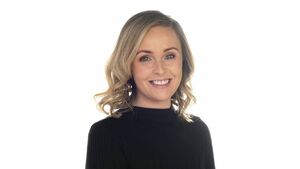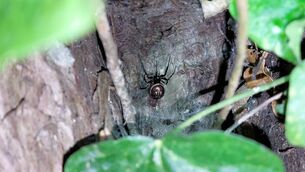'The smaller the screen, the more toxic the screen'

Debbie Cullinane: People have lost the attentions span to watch a movie.
Claremorris native Debbie Cullinane has built a successful career as a child and adolescent psychotherapist, a career you can clearly see brings her joy when she talks about it. After beginning her professional journey in insurance, she discovered her passion for working with children and promoting the power of play.
As a sensory partner with Smyth’s Toys and a leader in childhood development workshops, Debbie is dedicated to helping parents and educators foster playful, supportive environments for young learners, while addressing key challenges like screen time and emotional wellbeing.
We sat down to chat about her journey so far and why Debbie loves what she does so much.
Debbie, thanks for talking to me. Tell me a little bit about your background.
I'm from Claremorris - born and bred here. The house I am living in now is actually my home house that I grew up in. I went to college in Limerick, lived there for a good few years and I've been back in Claremorris for about 12 years.
What did you do in college, Debbie?
Initially I did a degree in International Insurance and European Studies. Really I just went there because I wanted to go to Limerick and that's what I got. I worked in insurance for a few years in Limerick and loved that. Then I decided I wanted to do something with children.
My Dad always said you should have been a teacher. And I was like, 'No, not for me'. Then what did I do? I went back and did the post grad and a HDip in teaching with Hibernia back in 2009. I went into teaching, worked in a school in Limerick for a while and then I did a teacher exchange because I decided I wanted to come home.
So I did the teacher exchange and worked in Headford for years until I took a career break because I was tutoring a little boy locally who had leukaemia. His parents had asked if I would mind tutoring him for the year and I said yes and took the year off. Before that, I had applied to do the Masters in Child and Adolescent Psychotherapy, specialising in play with the Children's Therapy Centre. So it worked out well because I had more time for college. It was a four year masters - so two years diploma and play therapy, two more years for the Masters. I had only intended on taking a career break for a year but I never went back.
What was the draw to working with children, Debbie?
I have a lot of cousins. There's 25 of us on my side and I'm the fourth eldest. So I always liked small children. I did my work experience during secondary school in the local national school. But then I decided I'm not going to be a teacher. But when it came to the actual decision to go into teaching later in life, I don't know where it even came from. I remember thinking, 'Actually, I'd like to try it and see'.
But I did find teaching really hard. Because I thought I'd just be good at it and it would be easy. But it was harder than I expected it to be. I did love it though. I had junior and senior infants in my last school for last few years, and I just loved it. I loved the play element.
So where did the idea of play therapy come from, Debbie?
It's a funny one and I thought about this a lot - my family are very playful and fun. Right up to my grandparents, they are all so playful. My granddad, who only passed away this July, actually started the scouts here in Claremorris back in the 1980s. It was the 9th Mayo Troop.
Never mind the silliness of it, I was always interested in the benefits of the playing. And then when I was in with the junior and senior infants, I did think there's so much to this, play is amazing, and it's exactly what children need to be doing. I had met a girl who was doing the course in the Children's Therapy Centre - her mother had started that particular course - I worked with her in Limerick, and I was amazed and fascinated. I thought this is definitely something that I want to dive into a little bit more.
My own two are Irish twins - I had Elsie in May 2015 and Freddie in May 2016. Then myself and my husband got married a year later.
I've always been academic, always been into studying and learning more and upskilling and I'm not finished - I will be doing courses until I die. So after I got married I thought, 'I just need something for me, I need to be Mommy, but I also need to still be Debbie'.
The first course I did was the Therapeutic Play Skills Level Six here in Claremorris with Laura Coleman. Then I moved to the other course and I was filling up my weekends with like-minded people, learning, coming away every weekend, saying, 'Ih, my God, I did not know that'.
It was just was fantastic but it was hard. Thankfully, my husband James is an special needs assistant (SNA). So he was able to support me through all the weekends away and all that went with it.
You've mentioned some of the challenges parents and children are facing these days around the use of screens. What are the main ones you see in your work, Debbie?
I think, as parents, we need to be able to manage it. I was definitely the Mommy - when my babies were one - who was like, 'Please, will you ever watch the telly? Because I need a break.' So I do think screens can be brilliant to give mothers or fathers a break when they just don't have the time to do everything.
But I think perhaps be aware not just to hand over the screens if they are acting up. We would have fairly strict rules in our house. There's no screens bar the bit of telly for 30 minutes before they chill out and read at nighttime. That's it during the week for the screens. And they just think it's completely normal.
Then at the weekend, they have a bit of time on the tablet or Freddie has an Xbox and he plays FIFA. We do about half an hour to an hour on Saturday and Sunday and that's it. Then we'll sit down and watch a movie. And do you know what's scary? People have lost the attention span to watch a movie.
I do think as well, we need to try and be very mindful of YouTube, even the kids one, because that's just hit after hit of dopamine. So it's getting one thing after another. It's not watching something solid and following a storyline. I really find that's affecting children's moods a lot.
And I think watching Bluey on Netflix is amazing. Bluey has the most fabulous messages and it's the most gorgeous show. I think the smaller the screen, the more toxic the screen.
Then obviously invitations to play with other things - it's just about finding what your child enjoys and leaving it there for them to enjoy. And letting them be bored. They say I'm bored and I say I wonder what you'll come up with to do. And they do toddle off and find something.
What do your days look like, Debbie?
Things just took off once I left college. Then I became sensory partner with Smyth's Toys in 2021 and partnered with them to do their sensory toy range. Then new things started transpiring through Instagram. When Covid hit, I was running webinars for parents and for teachers and SNAs.
I also do those in education centres all over the country. I did an in-person event then with another girl, Hayley Rice - an Empower event for parents. And I'm now Mum Talks ambassador for Mayo. I have a lovely event coming up in La Casa in Claremorris soon that I'm very excited about, so it's very varied. I often have a client in the morning.
I've also learned to pencil in time for me. It's a lovely balance because James is home at 3:15pm so he gets a chance to do his thing, go to the gym, come back and have that family time too.
What keeps you driven, Debbie?
I love spreading the word of play and playfulness in every facet that I work in. So I do parent workshops with childhood cancer and we say let's bring the playfulness back into our lives with children and with teenagers.
We don't stop playing because we grow old, we grow old because we stop playing. If we can bring playfulness into any area of our life, it's going to be better - whether we're managing behaviour with children or out with our friends or whatever we do and we're doing.
I really am passionate about supporting teachers, SNAs and parents to try to navigate this new world because I think it's a very new world, and we're getting thrown so much information now, and it's so hard to know what's right and what's not right. And when we know better, we can try to do better, but not to be putting ourselves under pressure to be perfect by any means.
What advice would you give to someone thinking about going back into education or starting a business, Debbie?
You'll know what's going to fill you up. For me, it was play and learning about how we work and about how children work. But for somebody else, it could be something else. Start from something very basic. Find a book in the area you like and see if you like the book. Or find a short course. There's so many little short courses online now that you can do just to dip your toe in. If that fills you up, maybe take another step forward and see if there something else that you could do to learn a little bit more and go from there.
Don't ever be afraid to try something new. Laura Coleman actually gave me the best piece of advice I ever got years ago when I was contemplating the Masters. I was talking to her and I said it would take an awful long time and she said to me, 'Well, Debbie, the time is going to pass anyway. The time will go anyway and you can upskill and become the best version of yourself, or you can stay the same.' Change is hard, but staying the same is hard as well. So it's great to just take the plunge and try it. And I don't think you'll ever regret trying something and failing at it if you don't really like it.





